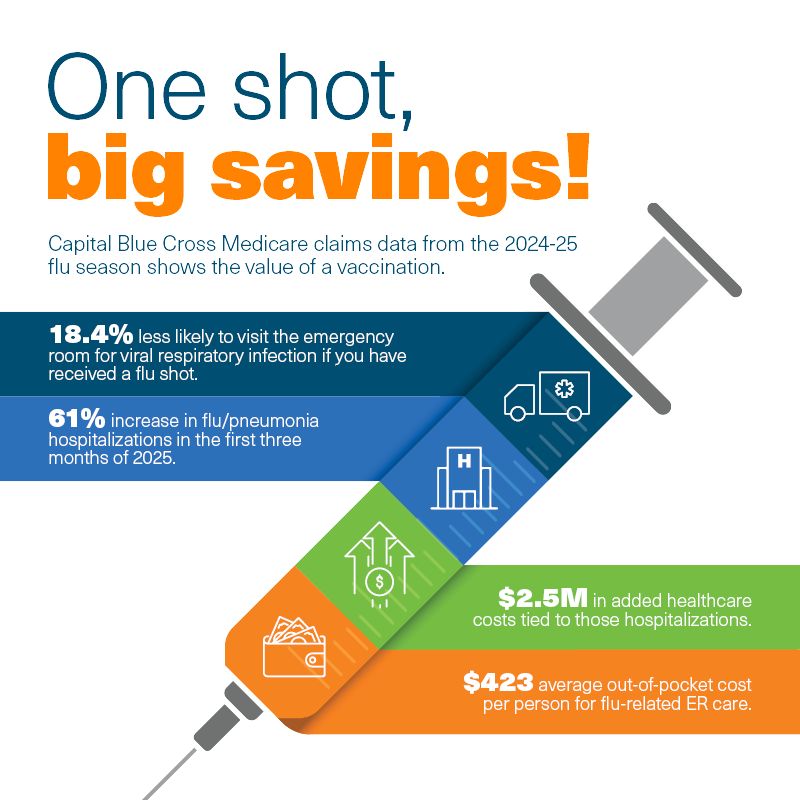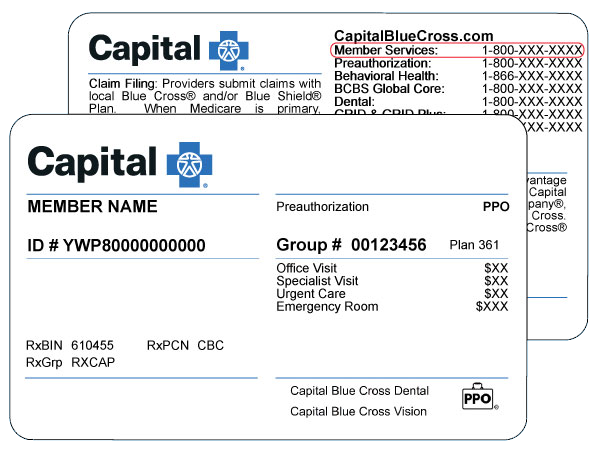
Protect yourself: Flu, pneumonia, and RSV vaccine information
You probably know that getting a flu shot lowers your chances of catching the flu. But even if you become sick, the vaccine can significantly reduce the risk of severe complications and hospitalizations as well as financial impacts.
Capital Blue Cross data from the 2024-25 flu season showed that seniors 65 years and older who received their flu shots were nearly 20% less likely to visit the emergency room for viral respiratory infections than those who were not vaccinated. Seniors who avoided the ER also avoided out-of-pocket expenses that averaged $423 per individual.
These numbers emphasize the importance of staying up to date on recommended vaccines—not just for the flu, but also for pneumonia and RSV. Whether you're protecting yourself or your loved ones, vaccinations are a simple step that can make a big difference.
Who should get the flu, pneumonia, or RSV vaccines and when?
Talk to your healthcare provider to decide which vaccine options may work for you. As part of Capital Blue Cross coverage, most members are eligible for preventive checkups, vaccines, and other services. Check out the suggested care schedule. These vaccines are covered as a preventive benefit for eligible members.
Where can I get flu, RSV, or pneumonia vaccines near me?
Your doctor's office is one of several options. Many pharmacies, health clinics, and health departments also provide vaccinations. Some providers and pharmacies allow online scheduling so you can find a time that fits your schedule.
If you choose to go to a pharmacy, contact your pharmacy to confirm vaccine availability and administration before your visit.
How can I find an in-network vaccine provider?
Capital Blue Cross members can use MyCare Finder to search for in-network providers. Staying in-network can save money. Some costs may not be covered by going out-of-network. Here is how to use MyCare Finder for your vaccine needs:
- Log in to access MyCare Finder, click Doctors by specialty and type vaccine.
- A list of in-network provider results displays.
- Use the filter options to refine your results. This includes items such as distance, language, specialty, gender, and more.
Be sure to check with the provider you select to confirm that they offer the vaccine you wish to receive.
Are flu, pneumonia, and RSV shots covered under my Capital Blue Cross health insurance plan?
Vaccines for the flu, pneumonia, and RSV may be included in your Capital Blue Cross health plan as a covered preventive benefit. Age restrictions may apply.
If you have Rx coverage with Capital Blue Cross, you can get vaccines at no cost from an in-network retail pharmacy. Show your ID card at any in-network pharmacy, supermarket pharmacy, or health clinic to have your shot covered by your applicable coverage benefit.
Log in to your secure account online to review your benefit plan documents or see your benefits at a glance to check your plan’s coverage information. If you still are not sure if you are covered or have questions, call the Member Services number on the back of your ID card.
How can I protect myself and loved ones from getting the flu?
Getting your annual flu shot is one of the best forms of protection. For additional preventive measures, view this flu resource from the CDC.
Who is eligible to receive the RSV shot?
RSV (respiratory syncytial virus) can cause serious illness, especially in infants, young children, and older adults. The CDC recommends different options depending on age and risk level:
Infants and Young Children
- Most babies should be protected from RSV using one of two options:
- A maternal RSV vaccine given to the mother during pregnancy (weeks 32–36, typically September through January), or
- An RSV antibody (nirsevimab) given to the baby after birth.
- Most infants do not need both. If the mother was vaccinated during pregnancy, the baby may not need the antibody shot.
- Some children ages 8–19 months may qualify for the RSV antibody if they are at increased risk for severe RSV (e.g., chronic lung disease, immunocompromised conditions, or other medical issues)
Adults
- A single dose of RSV vaccine is recommended for:
- All adults 75 and older
- Adults 50–74 who are at increased risk of severe RSV due to conditions like heart or lung disease, diabetes, or weakened immune systems
For more details, visit the CDC’s RSV guidance page and speak with your doctor,
Where can I learn more about RSV vaccines and prevention?
The CDC offers these resources:
Who should get the pneumonia vaccine?
The pneumonia vaccine—also called the pneumococcal vaccine—helps protect against serious conditions, including pneumonia, as well as ear, sinus, and bloodstream infections.
It is available to those 19 and older, according to the preventive schedule available on the Capital Blue Cross website. Consult with your doctor to determine which vaccines are right for you.
If I got the flu shot in January-February 2025, do I need to get it this fall?
Yes. The CDC recommends that everyone age 6 months and older receive a vaccine every flu season (which starts in the fall and runs into the winter). Because flu viruses constantly evolve, the vaccine is updated each season to match the most common strains. Even if you were vaccinated during the 2024-25 flu season, you’ll need a new shot to stay protected in 2025-26.
Does Medicare cover flu, RSV, and pneumonia vaccines?
The flu and pneumonia shots are covered under Medicare Part B. The RSV vaccine is covered under Medicare Part D.
This is not medical advice and is not intended to be a substitute for professional medical advice, diagnosis, or treatment. Always seek the advice of your physician or other qualified health care provider with any questions you may have regarding a medical condition or treatment. The information provided is meant for a general audience. Capital Blue Cross and its affiliated companies believe this health education resource provides useful information but does not assume any liability associated with its use.
